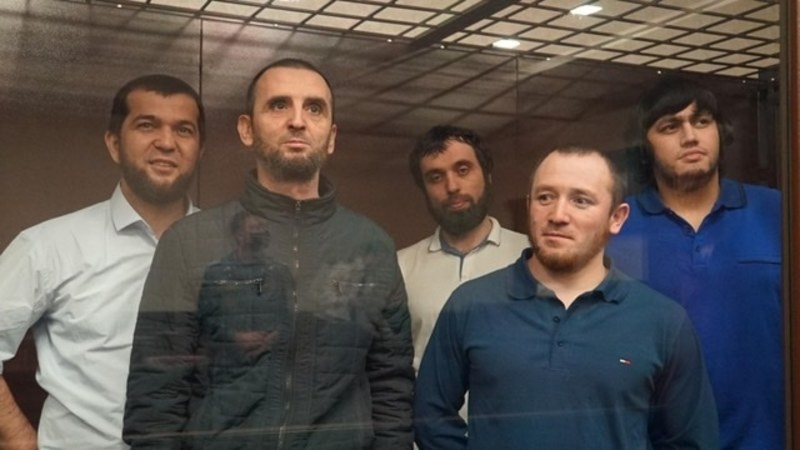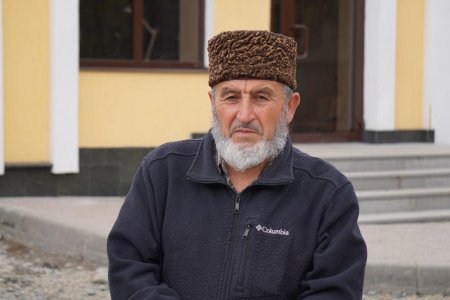
“Making a final address in a Russian court is like jumping from a plane with a parachute full of holes. You purportedly have the right, but there’s absolutely no point.” The above was how recognized Crimean Tatar political prisoner Akim Bekirov began his final address to the Russian Military Court of Appeal in Vlasikha (Moscow Region) on 7 July 2023. His words, like those of four other political prisoners: Eskender Suleimanov; Seitveli Seitabdiev, Rustem Seitkhalilov and Asan Yanikov were powerful and compelling, but totally powerless when the ‘judges’ pretending to hear the men’s addresses and defence’s arguments had almost certainly already prepared the ruling, rejecting the men’s appeals against 14 and 15-year sentences.
The notorious Southern District Military Court in Rostov has now passed sentences of 12 – 19-year sentences against 25 Crimean Tatar civic journalists and activists whose arrests in 2019 aroused international protest. Only 24 remain alive, with Russia having flouted its own legislation to continue torturing 60-year-old Dzhemil Gafarov and finally killed him on 10 February 2023. 15 of these sentences have now been upheld by the equally dodgy Military Court of Appeal in Vlasikha and have therefore come into force.
The appeals rejected on 7 July 2023 were against the sentences handed down on 18 March 2022 by presiding judge Aleksandr Generalov, together with Dmitry Merkulov and Aleksei Sannikov from the Southern District Military Court. The sentences were all one year lower than those demanded by Russian prosecutor Sergei Aidinov who has played a particularly active role in seeking huge sentences against Crimean Tatars.
The three judges sentenced Eskender Suleimanov (b. 1973), a technical engineer, and Asan Yanikov (b. 1986) were both sentenced to 15 years’ imprisonment. Akim Bekirov (b. 1988), an IT security specialist; Seitveli Seitabdiev (b. 1994), a civic activist; and Rustem Seitkhalilov (b. 1984), a carpenter received 14-year sentences. All are in harsh-regime imprisonment, with the first five years in a prison, the very worst of Russian penitentiary institutions. Each sentence included a further one year restriction of liberty after the men’s release.
Eskender Suleimanov is one of two brothers targeted in this, Russia’s most vicious attack on the Crimean Tatar human rights movement. His brother, Ruslan Suleimanov (b. 1983) a physicist and Crimean Solidarity civic journalist, was arrested first on 27 March 2019, with Eskender seized in June that year. When the FSB came to seize her elder son Zera Suleimanova became distraught and screamed at the armed and masked men. One of them then pulled out his gun and pointed it at her. She told him to shoot her now as they had taken her sons from her. “We’ll have time to shoot you all”, she was told.
The charges
All of the men were accused only of unproven ‘involvement’ in the Hizb ut-Tahrir movement, a peaceful transnational Muslim political and religious organization which is legal in Ukraine and which is not known to have carried out acts of terrorism anywhere in the world. Russia has never provided any grounds for its highly secretive 2003 Supreme Court ruling that declared Hizb ut-Tahrir ‘terrorist’, yet the ruling is used to churn out huge sentences on supposed ‘terrorism’ charges. In occupied Crimea, it is used as a weapon against journalists and activists from the Crimean Solidarity human rights movement. The five men whose sentences have now come into force were charged under Article 205.5 § 2 of Russia’s criminal code, as well as with the even more surreal Article 278 (“planning the violent seizure of power and change in Russia’s constitutional order”). Not one of the armed searches of the men’s homes had found any weapons, nor indeed had the FSB even pretended to look for anything but so-called ‘prohibited literature’.
No evidence
In these flawed prosecutions, no evidence is required of ‘terrorism’, with ‘involvement’ in Hizb ut-Tahrir supposedly enough to warrant the charges.
There is, however, also no evidence of involvement. Instead of actual proof, the FSB typically plant ‘prohibited literature’ during armed searches carried out without the men’s lawyers allowed to enter.
The charges largely hinged on illicitly taped conversations from 2016 during which the 25 men discussed religious, political and other, entirely innocent, subjects. Transcripts of the scarcely audible conversations were sent to FSB-loyal ‘experts’ who essentially provided the assessments demanded of them. The defence were able to provide an expert assessment which found that the tapes had been tampered with, yet this was ignored by the court, as was an independent religious specialist’s damning assessment of the primitive mistakes made by the supposed religious expert, Mukhammed Zaripov.
The second component part of these prosecutions is their reliance on anonymous witnesses whose testimony cannot be verified and who may well not even know the defendants. These were several such ‘witnesses’ in these ‘trials’, including one whose testimony was shown to have changed in accordance with the change in the indictment with respect to one of the defendants. Russia was recently criticized in the UN Secretary General’s report on occupied Crimea for convictions based almost exclusively on anonymous testimony, with the Secretary General also noting the dubious role played by the court in preventing exposure of flaws in such ‘testimony’. There is no reason for keeping any ‘witnesses’’ identity secret and there is very strong evidence that men are being tortured or threatened with imprisonment if they do not agree to ‘cooperate’ with the prosecution.
Flagrant political and religious persecution
Russia is already in violation of international law through its application of Russian legislation in occupied Crimea and its effective deportation and imprisonment in Russian prisons of Ukrainian citizens.
The arrests of 25 men on 27 March 2019 or shortly afterwards elicited international condemnation with UN, European and other bodies, as well has human rights NGOs, unequivocal in calling them an attack on the human rights movement in occupied Crimea. The US State Department demanded the men’s release and that Russia stop “its unjust arrests; detentions; searches and persecution of Crimean Tatar activists and journalists.” Human Rights Watch stated that attempts to portray politically active Crimean Tatars as terrorists were aimed at silencing them, while Freedom House and Civil Rights Defenders said that the arrests were aimed at terrorizing Crimean Tatars, and had nothing to do with fighting terrorism. All of the men arrested were recognized by the authoritative Memorial Human Rights Centre as political prisoners, and their release has been repeatedly demanded by UN and other international bodies.



